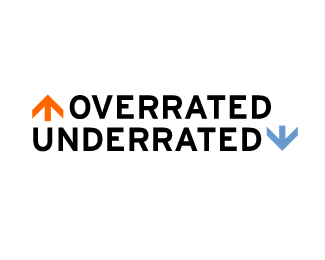NOTE: My current favorite sports talk show is the Russillo and Kanell Show that airs nationally on ESPN radio. On the show, the hosts occasionally do a 'rated' segment where they categorize sports teams, players, and other aspects of sports and pop culture into one of three buckets. 'Overrated' for things they think are generally praised or valued more than they should be. 'Underrated' for the opposite - things that do not get enough attention or accolades. And finally 'Properly' rated, for the things that receive about the correct level of praise or derision.
It is a fun segment, complete with sound effects, and in the spirit of running out of good ideas this week, I am going to steal borrow for this site. So here goes, the fourth installment, of 'Over, Under, and Properly Rated' (SFB edition). I am going with a business travel theme this time, since I have been back on the road some after a January lull and also because I am pretty sure the world does not need another blog about employee engagement or robots coming for our jobs right about now.
So here goes...
Overrated
1. The fun places you will see! - Writing this from a hotel room in rainy, damp, dreary Cleveland. That is not a knock on Cleveland, you could substitute Newark, Pittsburgh, or Dallas and it would be pretty much the same. At least half, if you are lucky, of the places you will travel for business are places you'd never go to otherwise.
2. Turn down service - Let me see, I had to jump to attention with a startling knock on the door so that someone could fold back the blanket a foot and a half and drop two milk chocolate squares on the night stand? No thanks.
3. The hotel indoor pool - Unless you are traveling with kids under 10, you will never, ever dip a toe in the indoor pool. Can that room smell any weirder?
4. 'Comfort' Class - You just paid $59 more each way for 1.2 inches additional leg room. And one 'free' Bud Light.
5. Going out for drinks/dinner with the local staff - Usually fun for about an hour. Then the locals are all thinking 'It's Wednesday night, I have things to do at home, when can I get out of here?', and you start thinking, 'I had to get up at 3:45AM to catch my flight here, I am about to crash hard. When can I get out of here?'
Underrated
1. Hotel in-room coffee makers - You might take these for granted. You might even think the quality of the coffee is terrible, (it is). But tell me how much you enjoy that 37th floor city view room in Vegas until you realize that there is no coffee maker in the room and you're facing a 18 minute trek and a 23 minute long wait at the Starbucks in the lobby.
2. The chance that being around all those people in tight spaces like planes will make you very sick - The sickest I have ever been in my life was about seven or so years ago when I picked up the Swine Flu (remember that), after a quick two-day, one-night trip into NYC for business. I was knocked flat for 10 days, every muscle I had (not many) ached, and I don't think I got off of my sofa for more than 8 minutes a day. The illnesses you can pick up on a commuter flight to JFK are legion.
3. The Sky, Admiral's, Captain's or whatever Club you use at the airport - This is the best travel investment that any regular business traveler can make, (yes, I would rate it higher than TSA Pre-check). Just one bad weather night and a 7-hour layover in JFK or LGA will make the $500 or so annual fee worth it right there. And it seems to me that the Airport Clubs are all getting nicer, while almost every other aspect of air travel is getting worse.
4. Business/First class to Asia, (or anywhere else really far) - Another investment I would recommend, (even better if you can get someone else to fund this), is the splurge upgrade to Business/First Class for any flight you may have to take of 12 hours or more. Why? Because if you only take this kind of a flight once in your life, you will always remember it as the best flight you ever had. The last Business Class pod I had on a flight to China was bigger than my first apartment. And the food was much better too.
5. Frequent Flyer Status - Things get a little better with 'Gold' status. Things get better still with 'Platinum' status. But things get much, much better with 'Diamond' status. Which it is why it is so hard to get. And worth every stopover in Detroit instead of flying directly to Chicago that you have to endure. If you are just starting to travel for business, pick one airline and stick with it. Cling to it like grim death if you must. You want status.
Properly Rated
1. Room service - Pros: It's food that someone brings to your room after you make one phone call. And you can eat in your bathrobe and no one cares. Cons: Overpriced, usually mediocre food.
2. Rental cars - Pros: It is someone elses car! Let's do a neutral drop as we pull out of the Courtyard by Marriott! Cons: How do I turn on the headlights? Arghhh! That was the windshield wipers!
3. 'Local' TV/news - Kind of fun to watch a different city's local news shows to get a little bit of the flavor of the place. But tempered by the fact that local car dealers and personal injury attorney advertising is just as annoying on the road as it is at home.
4. The Hotel Gym - Often, you will be so bored and stir crazy in your room that you will work out more when you are on the road which is good. But, it is a hotel gym. You see some strange stuff in there.
5. Eating at Chili's, Applebee's, or any other place you can eat at that is within five minutes of where you live - Sure, you feel like a jerk for eating at a nondescript chain place. But, it probably saves you at least 27 minutes of scrolling through Yelp trying to figure out if 3.5 stars means the same thing in San Antonio as it does in Des Moines.
What do you think? Do I have it right?
Is this post itself over, under, or properly rated?
Have a great day.
 podcast tagged
podcast tagged  HR,
HR,  HR Happy Hour,
HR Happy Hour,  Recruiting,
Recruiting,  employer brand,
employer brand,  podcast
podcast  Email Article
Email Article 
 Print Article
Print Article 


